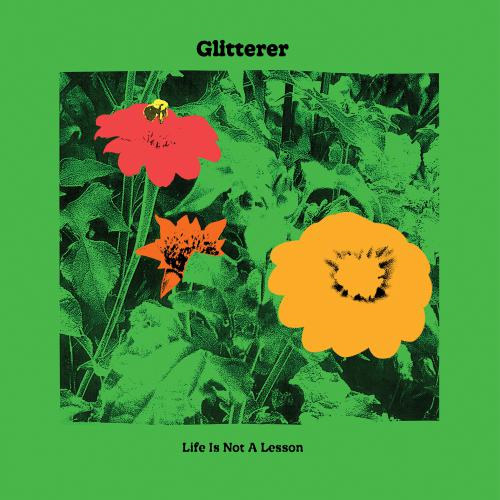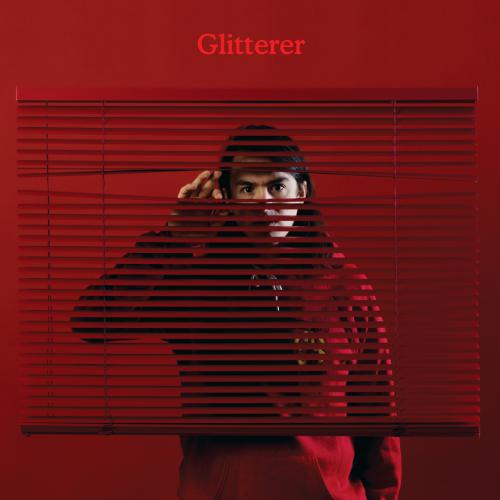Band: Glitterer
Album: Life Is Not A Lesson
VÖ: 26.02.2021
Label/Vertrieb: ANTI-/Indigo
Website: www.glitterer.com
IT’S BEEN SAID BY MORE THAN ONE TERMINALLY DOUR CULTURE CRITIC THAT TO MAKE, OR EVEN CARE ABOUT, ART IN THE WAKE OF MASS ATROCITY IS CALLOUS, BARBARIC EVEN. IF THAT’S TRUE THEN WHAT ARE WE UNFORTUNATE DENIZENS OF 2020 TO MAKE OF GLITTERER’S DECEPTIVELY UPBEAT, SYNTH-INFUSED INTROSPECTIVE ROCK MUSIC, WHICH IS STILL BEING RECORDED AND RELEASED IN THE MIDST OF GLOBAL PLAGUE? WELL, THE WORLD MAY HAVE ENDED BUT LIFE GOES ON, AND SO DOES CONSCIOUSNESS, BOTH INDIVIDUAL AND COLLECTIVE. WHICH MEANS GLITTERER STILL HAS A JOB TO DO.
Washington, D.C.,resident and northeastern Pennsylvania native Ned Russin co-fronted Title Fight for many years before the band suspended operations and Ned became Glitterer. Actually, he had always been Glitterer, just as Glitterer had always been him, but there were no Glitterer records until 2017, when the first of two self-released EPs appeared. Those were odd, charming, clever, eloquent, and highly proficient records, hand-made in the spartan bedroom-pop mode: some programmed drums and keyboards with an electric bass and a voice. The songs were about the trap of self-awareness and the impossible dream of self-negation; and despite their being, combined, all of about 18 minutes long, they left long-lasting impressions, stuck themselves in peoples’ heads and stayed put. They attracted a good amount of attention, too, because, yes, many music fans and “industry observers” knew who Ned was. But there was nevertheless a lower-stakes air around the project in those earlier days — something interesting and inchoate that Ned was fiddling with.
But then Glitterer started touring — Ned at the wheel of the rental car, a laptop full of backing tracks riding shotgun — and then came a record deal, and before you knew it there were videos and a debut full-length, Looking Through The Shades. That record came out on Anti- in the summer of 2019, a faintly remembered and much-romanticized period during which musicians were criss-crossing the world, performing live and in the flesh for crowds well in excess of five people. Recorded and co-produced by Arthur Rizk (Code Orange, Power Trip), Looking Through The Shades had a much bigger sound than the EPs — fuzzy guitars, live drums, a nice wide stereo mix befitting the best crunchy indie rock — and it had a cohesive, if somewhat oblique, visual concept that recurred in the videos, press materials, and album layout and that involved Ned going about various banal activities while wearing a red vintage Gorilla Biscuits hoodie. The album was a tight piece of work, is the point: it had vision, focus, ambition, and scope, even though, as before, most of the songs were remarkably concise and direct. It was the work of a curious and confident professional musician engaging perspicaciously with the world as it (then) was.
We all know what has happened since: across-the-board erasure of every single presupposition and condition-to-be-taken-for-granted. A sudden and comprehensive blanking of the slate. A whole new world and a whole new metaphysical terrain. And into this new context of no context comes the second Glitterer full-length album, Life is Not A Lesson, out on Anti- this February.
This time Ned has produced the record himself, notwithstanding some recording and performance help from his twin brother, Ben, and some other friends, as well as mixing and mastering by Rizk. Would it surprise you to hear that, irrespective of worldly doom and gloom, the new songs are even catchier and bigger-sounding than the Looking Through the Shades material? With roomier drums and more electric-guitars-per-square-inch than ever, Life is Not a Lesson has a way of evoking an alternate-universe version of Guided By Voices, one with a hardcore-punk background. And if there was, perhaps, an indirect or “meta” aspect to the pop appeal of Glitterer’s older records, there’s essentially none of that here: this is Glitterer’s most insistently and proudly accessible work. To wit: the single “Didn’t Want It,” a slowed-down, fuzzed-out invocation of Sebadoh’s driving infectiousness circa Bakesale and an unsentimental ode to abandoned ambitions (“Didn’t want to want it all / Found a word, made me feel small … Didn’t want it / Did I now?”).
Lyrically, as with the prior catalog, many of the songs on the new record are short, dialectical considerations of the countless daily miniature panic attacks that attend the rigorously examined life. Take, as a prime example, the epistemological riddle “Are You Sure? (“Feel it in my spine / Certainty is mine / Are you sure?”), whose arrangement combines the tension-building properties of GBV’s “Hot Freaks” with the tension-resolving blast of something like “Gouge Away” (that’s the song, not the band). Life is Not a Lesson proves to be a rigorous reckoning with the life of the mind at a time when there’s not much life outside the mind.
Of course we should make and cherish art in the wake of human tragedies. Those who say otherwise make the mistake, common among too-clever-by-half critical theoreticians, of assuming that art is only ever about prestige, propriety, and good taste — a frivolous social game played by elites with nothing on the line. The truth is that art — the real thing, the good stuff — might be the only part of modern life that isn’t barbaric. The darkest and deadliest events in our history, like the manifold calamities of 2020, aren’t pieces of an academic puzzle to be pondered from a safe remove. Tragedy is not “material”; it’s life. Life is not a lesson; it’s life. And life goes on. Knowing that, all we can do is heed the title track of Glitterer’s new album (maybe the closest thing to an intellectual manifesto that we’ll ever get from Ned Russin): “Think aloud / Inherit doubt / Build another bridge for them to burn / Run away / Speak slowly / Life is not a lesson to be learned.”
Infos zur vorherigen Veröffentlichung:
Band: Glitterer
Album: Looking Through The Shades
VÖ: 12.07.2019
Label: ANTI- / Indigo
Website: https://glitterer.com/
Glitterer was born in August of 2017, when the eponymous Glitterer EP appeared on Bandcamp. To some, Glitterer seeed to manifest the parallel identity, something between an alter-ego and a superego, of Ned Russin, who wrote, sang, and played every note of the EP’s eight songs. Ned Russin is a New Yorker, by way of Northeastern Pennsylvania, a 29-year-old bassist and singer who made his name in music by playing in a band called Title Fight.
Glitterer features spartan instrumentation — bass, drum machine, synths, and a familiar voice — and its compositional ethos, such as the listener can grasp, lies in hyper-efficient deployment of discrete harmonic and melodic ideas, also known as verses, choruses, and bridges. The introspective but gnomic lyrics address the kinds of ontological, existential, epistemological, ethical, and moral questions one would expect might occur to a 20-something liberal-arts college student (which Ned was, at Columbia, at the time of Glitterer’s release) all while wryly acknowledging the predictability of such heady questions’ arising under such heady conditions.
Not Glitterer, a five-song follow-up, appeared eight months later. As is suggested by the antinomic title, the newer EP is even more preoccupied with contemplating the exigencies and implications of regarding oneself and of regarding oneself regarding oneself and, of course, of regarding oneself regarding oneself regarding oneself. And, as with the first record, no song extends a second beyond what’s necessary to deliver the minimally viable aesthetic and intellectual goods. One would be hard-pressed to name an artist that conveyed a higher concentration of stimulation and aural pleasure in 2017 and 2018.
At this point in the story, Glitterer was all but bound to be forced into certain boxes. Here we had what appeared, at a casual glance, to be an erstwhile rock musician’s inevitable solo-electro project, consisting as it did of cleverly written songs whose principal subject was the very self that had conceived them. And this at a time when the most talked-about independent musicians were radically self-involved “Soundcloud rappers,” a time whose zeitgeist, engineered in large part by Silicon Valley’s oligarchs and their data-harvesting social networks, produced and nurtured the most narcissistic individuals in the most narcissistic moment in the history of the most narcissistic society in the history of the world. In this context, Glitterer must be a low- or no-stakes novelty exercise in recreational solipsism. Or else one disingenuous man’s cynical bid for a slice of the post-Lil Peep streaming-revenue pie. Or else a bit of self-serious critical-theory cosplay meant to flatter the intellectual vanity of budding coastal elites. Or maybe a toxic mix of all three?
But anyone harbouring such suspicions was disabused of them as soon as they saw Glitterer play live during this period. Recordings are plastic objects (in more senses than one) onto which listeners project their biases: A musician who tries to convey vulnerability, earnestness, or self-effacement solely through records is at the mercy of those who would superimpose onto them their own cynicism. (This is, after all the most narcissistic moment in the history of the most narcissistic society in the history of the world.) Live performance is different: A musician who goes out of his way to commune in good faith with people who themselves have gone out of their way to stand together in a room — such a musician is not so easily dismissed. And so it was that, accompanied only by a microphone stand and a Mac laptop perched on a stool like a standup comic’s glass of water, Ned performed 42 U.S. shows from 2017 to 2019, mostly opening for punk and hardcore bands. His dad called it his karaoke act.
But the live show, too, was a contingency, a temporary means to an end that, like the EP’s, occluded an essential paradox: Glitterer is a solo project, Glitterer is Ned Russin — but Glitterer is, and has always been, a band.
Hence Looking Through The Shades, Glitterer’s debut full-length album, out on Anti- in summer 2019. Recorded in the cozy carpeted basement of the Russin family home, in Kingston, Pa., and co-produced by indie-rock prodigy Alexander Giannascoli and the Arthur Rizk (Code Orange, Power Trip, Sumerlands, the 2018 Grammy Awards), the album not only contains Glitterer’s best-yet sonics and songs; it has been constructed in such a way as to evince a spirit — co-operative, semi-schizophrenic, greater than the sum of its parts — that is proper to rock bands and that is inaccessible to even the least self-involved Soundcloud rappers and bedroom artists.
Simply put, Looking Through The Shade is the sound of a group of people playing music, together, in a room. Now we have live drums (Ned’s brother Ben does the honours) and dopamine-releasing fuzzy guitars (Ned’s other brother Alex contributes a solo) to go with the synths, the bass, and the voice. Now we have a 14-song-long thematic arc, carefully sequenced. Meanwhile, the lyrics are still reluctantly but rigorously self-aware, the choruses are still habit-formingly catchy, and the arrangements still carry not an ounce of excess fat. From the saturated distortion of the opener, “The Race” (“I wish I could look at your life and know it’s mine”), through the road-weary “1001” (“I sang 1,000 songs / Didn’t want to sing again”) and the vox-and-bass-only Side B outlier “The News” (“I used to be original”), listeners are invited to join the album’s team of creators in wrestling with the defining psychological and social conditions of our age. And thus we discover that Glitterer invokes solipsism not to glorify or revel in it but to understand and rise above it, and that Glitterer knows that no individual can accomplish such a task alone, which is why Glitterer is a rock band and always has been, even when only one person’s name was attached to it.
Glitterer was born in August 2017 and now, with Looking Through The Shades, Gitterer has come of age.




